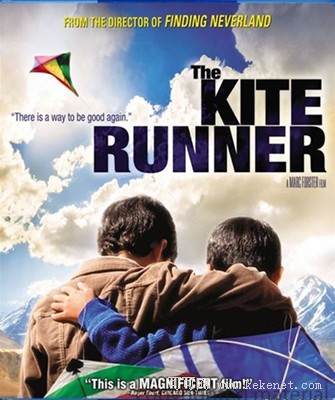(单词翻译:单击)
THE STREETS GLISTENED with fresh snow and the sky was a blameless blue. Snow blanketed every rooftop and weighed on the branches of the stunted mulberry trees that lined our street. Overnight, snow had nudged its way into every crack and gutter. I squinted against the blinding white when Hassan and I stepped through the wrought-iron gates. Ali shut the gates behind us. I heard him mutter a prayer under his breath--he always said a prayer when his son left the house.
街上新霁的积雪银光闪闪,天空蓝得无可挑剔。雪花覆盖了每一个屋顶,矮小的桑椹树在我们这条街排开,树枝上也堆满了积雪。一夜之间,雪花塞满了所有的裂缝和水沟。哈桑和我走出锻铁大门时,雪花反射出白晃晃的光芒,照得我睁不开眼。阿里在我们身后关上门。我听见他低声祈祷--每次他儿子外出,他总是要祈祷。

I had never seen so many people on our street. Kids were flinging snowballs, squabbling, chasing one another, giggling. Kite fighters were huddling with their spool holders, making lastminute preparations. From adjacent streets, I could hear laughter and chatter. Already, rooftops were jammed with spectators reclining in lawn chairs, hot tea steaming from thermoses, and the music of Ahmad Zahir blaring from cassette players. The immensely popular Ahmad Zahir had revolutionized Afghan music and outraged the purists by adding electric guitars, drums, and horns to the traditional tabla and harmonium; on stage or at parties, he shirked the austere and nearly morose stance of older singers and actually smiled when he sang--sometimes even at women. I turned my gaze to our rooftop, found Baba and Rahim Khan sitting on a bench, both dressed in wool sweaters, sipping tea. Baba waved. I couldn't tell if he was waving at me or Hassan.
我从来没有见到街上有这么多人。儿童在打雪仗,拌嘴,相互追逐,咯咯笑着。风筝斗士和帮他们拿卷轴的人挤在一起,做最后的准备。周围的街道传来欢声笑语,各处屋顶已经挤满了看客,他们斜躺在折叠椅上,暖水壶里的红茶热气腾腾,录音机传出艾哈迈德·查希尔(AhmadZahir 1946~1979,阿富汗歌星)喧闹的音乐。风靡全国的艾哈迈德·查希尔改进了阿富汗音乐,给传统的手鼓和手风琴配上电吉他、小号和鼓,激怒了那些保守的教徒。无论在台上表演还是开派对,他都跟以前那些呆板的歌手不同,他拒绝木无表情的演出,而是边唱边微笑--有时甚至对女人微笑。我朝自家的屋顶看去,发现爸爸和拉辛汗坐在一张长凳上,两人都穿着羊毛衫,喝着茶。爸爸挥挥手,我不知道他究竟是跟我还是跟哈桑打招呼。
"We should get started," Hassan said. He wore black rubber snow boots and a bright green chapan over a thick sweater and faded corduroy pants. Sunlight washed over his face, and, in it, I saw how well the pink scar above his lip had healed.
"我们得开始了。"哈桑说。他穿着一双黑色的橡胶雪靴,厚厚的羊毛衫和褪色的灯芯绒裤外面,罩着绿色的长袍。阳光照在他脸上,我看到他唇上那道粉红色的伤痕已经弥合得很好了。
Suddenly I wanted to withdraw. Pack it all in, go back Home. What was I thinking? Why was I putting myself through this, when I already knew the outcome? Baba was on the roof, watching me. I felt his glare on me like the heat of a blistering sun. This would be failure on a grand scale, even for me.
突然间我想放弃,把东西收起来,转身回家。我在想什么呢?我既然已经知道结局,何必还要让自己来体验这一切呢?爸爸在屋顶上,看着我。我觉得他的眼光像太阳那样热得令人发烫。今天,即使是我,也必定难逃惨败。
"I'm not sure I want to fly a kite today," I said.
"我有点不想在今天放风筝了。"我说。
"It's a beautiful day," Hassan said.
"今天是个好日子。"哈桑说。
I shifted on my feet. Tried to peel my gaze away from our rooftop. "I don't know. Maybe we should go Home."
我转动双脚,试图让眼光离开我们家的屋顶。"我不知道,也许我们该回家去。"
Then he stepped toward me and, in a low voice, said something that scared me a little. "Remember, Amir agha. There's no monster, just a beautiful day." How could I be such an open book to him when, half the time, I had no idea what was milling around in his head? I was the one who went to school, the one who could read, write. I was the smart one. Hassan couldn't read a firstgrade textbook but he'd read me plenty. That was a little unsettling, but also sort of comfortable to have someone who always knew what you needed.
接着他上前一步,低声说了一句让我有些吃惊的话。"记住,阿米尔少爷,没有鬼怪,只是个好日子。"我对他脑海盘桓的念头常常一无所知,可是我在他面前怎么就像一本打开的书?到学校上学的人是我,会读书写字的人是我,聪明伶俐的也是我。哈桑虽然看不懂一年级的课本,却能看穿我。这让人不安,可是有人永远对你的需求了如指掌,毕竟也叫人宽心。


